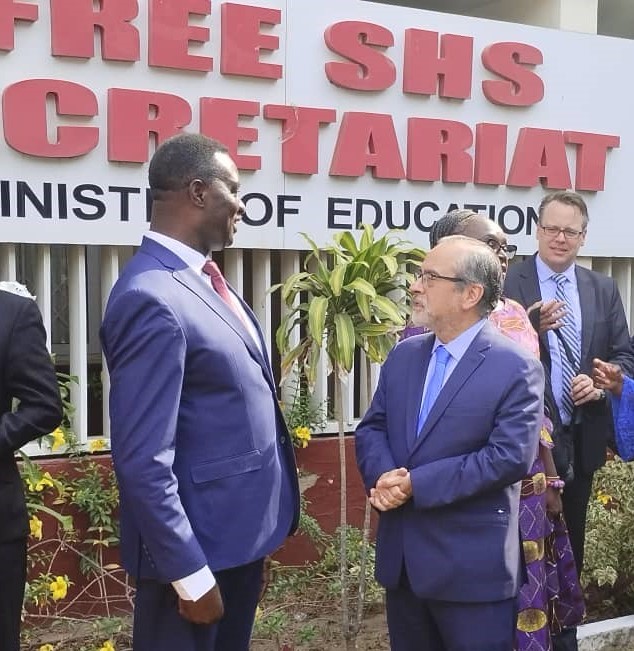The World Bank has assured the country of its commitment to supporting government’s efforts to improve education and provide every child with the opportunity to reach their full potential.
The Bretton Woods institution says it sees education as a critical foundation for development and a key driver of economic growth and poverty reduction, hence its resolve to bring improvement.
This assurance was made by the World Bank’s Global Director for Education, Dr. Jaime Saavedra, during a courtesy call on the Minister for Education, Dr. Yaw Osei Adutuwm, as part of his two-day visit to the country.
“Education is a critical foundation for development and a key driver of economic growth and poverty reduction. As a global development organisation, it is our privilege to support the government of Ghana in its efforts to improve education and provide every child with the opportunity to reach their full potential,” the World Bank representative stated.
He further added: “We are committed to working with government and all stakeholders in the education sector to address the challenges and find innovative solutions to improve the quality of education in Ghana. Our goal is to ensure that every child has access to quality education and the opportunities it provides for a better future”.
The Minister of Education and the World Bank Global Director for Education met to discuss primarily the strategic vision for education in Ghana – including Science, Technology, Engineering and Mathematics (STEM) education, and higher education and skills training.
The Bank’s Global Director for Education paid a visit to the Mantse Tackie l & 2 Primary school to see first-hand activities being implemented under the Ghana Accountability for Learning Outcomes Project (GALOP). He also visited Accra High School to observe the Ministry of Education’s latest efforts in introducing STEM courses at public Senior High Schools.
Currently, the Bank and government is implementing the Ghana Accountability for Learning Outcomes Project (GALOP) over a five-year period (2020-2024) with financing from International Development Assistance (IDA) credit of US$150million and a Global Partnerships for Education (GPE) grant of US$24.4million.
The proposed Additional Funding will be supported by a US$15million grant from the GPE emergency COVID-19 accelerated funding window; a US$25.5million grant from a Global Partnership for Results-Based Approaches (GPRBA) financed by DFID; and US$4.5million financed by government.
An additional US$500,000 from the GPE ESPIG and US$200,000 from the GPE emergency COVID-19. Accelerated funding window will be allocated as the supervision fee. This will bring the total project financing to US$218.7million.
The World Bank representative expressed honour in supporting national strategies and international efforts through financing and technical assistance. He added that the Bank’s role is to augment national efforts. Mr. Saavedra also mentioned his outfit’s plans to visit schools and universities to assess and gather more information on ongoing programmes.
The emphasised the importance of the Bank’s role in supporting educational development in Ghana, adding that the mission is to help countries reach their development goals and improve the lives of their citizens.
At the meeting, the Minister for Education also indicated that government plans to upgrade junior schools in rural communities across the country.
The government-funded project will see the number of junior high schools in communities reduced from 10 to one, with the capacity to accommodate at least 1,000 students. This will result in major efficiency savings, as government will no longer need to pay allowances for 10 headmasters, and supervision of teaching and learning will become much easier.
In addition to this, government will also be investing in science labs and virtual labs to promote STEM activities, as well as boosting science enrolment for girls.
Dr. Adutwum noted that “parity is not just about inspiring” when it comes to girls’ education, and he is hopeful that these investments will help to close the gender gap in STEM.
He also stated that government is working with the Open University-UK to provide virtual labs, so that students can still access science education even in remote locations.










